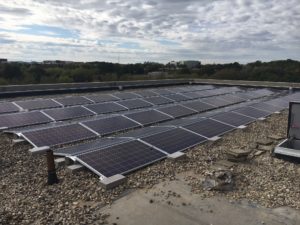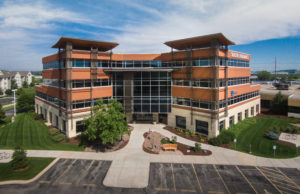SUSTAINABILITY IMPACTS INVESTMENT DECISIONS
More investors than ever before are conscious of the effects their money can have on the environment, and that includes those investing in the commercial real estate market. Today, more than 25% of all managed assets today are invested with sustainability in mind, according to a 2017 McKinsey and Company study and 58% of investors believe sustainable investing will be mainstream within the next decade.
Environmental, social and governance (ESG) refers to the three central factors in measuring the sustainability and ethical impact of an investment. It’s become so popular with investors, that S&P Dow Jones Indices is launching a performance tracking tool for socially responsible investing called the S7P 500 ESG index.

Solar panels for the Park West II building in University Research Park produce 27,600 kWh of power and energy savings of $4,600 per year.
The overall purpose of sustainable investing is literally to change the world for the better. Of course, the ideal scenario is where you find opportunities that produce the highest returns and have the highest positive impact. Some argue that more often than not, there is a trade off to be made and that all true ESG investing involves sub-commercial returns. Others have the expectation that sustainable investments should perform comparably to or better than conventional equivalents.
‘ESG is not just a temporary “feel good” exercise or the latest buzzword,” according to an online article in Forbes. “ Investors have ongoing concerns for the future that need to be addressed…. these issues include aligning business strategies for the greater good and being responsible to the communities they serve.”
In commercial real estate, the largest ESG concern is environmental sustainability, as commercial buildings are responsible for 39% of gas emissions in the United States. ESG investors are looking for sustainable projects that promote efficiency in terms of waste, water and energy and have low impact on their immediate environments.
Compass Properties has long embraced ESG and sustainability as core values. It closely adheres to award-winning sustainable facility management practices. “We work hard to make sustainability a strong part of our culture,” said Todd Greenwald, the Compass Properties executive who spearheads the company’s sustainable facilities management practices. “For all our properties, we set out with three goals in mind: reduce waste, encourage healthy lifestyles, and implement energy-saving programs.”
Compass Properties has earned numerous awards for its sustainability efforts, including the IFMA’s Sheila Sheridan Award for Sustainable Facility Management, BOMA’s (Wisconsin) Outstanding Building of the Year Award, Bicycle Friendly Business Award from the League of American Bicyclists, LEED Certification for many of its office centers and recently a Platinum Award of Excellence from Global FM, a world-wide facilities management association.
As ESG continues to grow in influence, real estate investors will seek out projects that not only show strong returns, but ones that make a positive impact. Green buildings and developments that demonstrate environmentally sound practices will be at the top of their wish lists.

